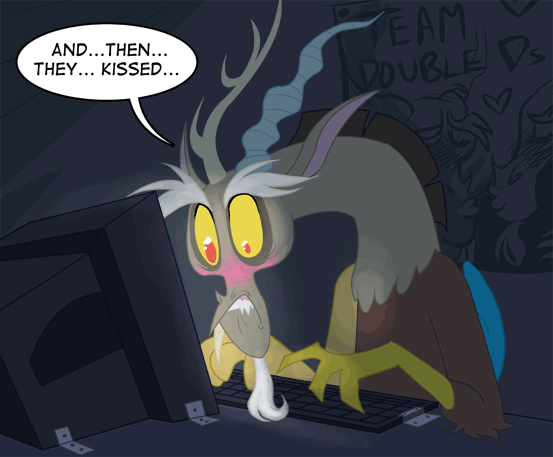
Part One of "How I Learned To Stop Worrying And Love The Players"
I'm gonna try to make this a thing I do, since some folks out there actually read blogs; hopefully my experience with roleplaying and game-mastering will be able to help others develop themselves and their characters into dramatic powerhouses... or, at the very least, something more fun than it may already be.
In the first installment, I think I wanna show the folks out there running these things how to work with one of the most important components of a storytelling game: The Players.
A lot of gamemasters are actually somewhat intimidated by their players. That's right: INTIMIDATED. I'm not talking about "gimme a lightsaber, or I'll wedgie the hell outta you, nurd" intimidation, but I mean the fact that some players have a tendency to run off-track, and a good GM has to find a way to keep things from running away from them.
But there are a few little tweaks you can use to enforce more structure without restricting the player's free will - which is actually their (and YOUR) greatest strength. I could yammer on for a while, but I work better with examples... oh, look! Examples, right below - how convenient!
FLAW-KILLING: The act of wiping out/changing a carefully planned-for flaw. Usually perpetrated by new players or Power Gamers. Bogus Level: 6/10
Okay, so let's have a moment where we pretend there's a particular situation, and then I'll show off a few tricks to make things a little... well, cooler. At least 20% cooler, I promise.
The Situation [cue suspenseful music]:
A player takes an interest in a character you've put forth. More precisely, they've taken such an interest that they're posting as if they plan to tackle that character's biggest flaw and solve it, right off the bat. This might make them feel accomplished, but all the possible ideas from the issue are forever lost. How do you keep the problem from getting nixed while still retaining player free will?
Solutions [heroic trumpet-laden fanfare]:
Well, there's always the idea that you can just let them solve it, and pass on the flaw to another character. It's a fast & cheap tactic that'll get you out of a jam - but it's like a patch job on a bicycle tire; it's gonna look tacky as hell if it's not what it's meant to look like.
There's the idea that you could make the character unavailable for some reason. Maybe they got caught up in something happening elsewhere, or they might have been kidnapped or otherwise indisposed. Again, a patch job because they'll eventually want to interact with them at some point.
What about this: what if the flaw turns out to be crucial to something later? Maybe that stutter the NPC has gets cured by the player performing neurosurgery... only to have that specific stutter make all the difference when it comes to opening the voice-activated secret room where a major goal is?
What about this: let them think they've cured it, but it changes? Sure, the alien illness that was causing the NPC endless pain got diagnosed and medicated by the player, so it's not a problem anymore, right? WRONG-O! The chemicals might have reacted with the alien disease, causing the carrier to display not a single symptom... yet, for some reason, people around them often tend to get sick for seemingly no reason.
What about this: turn the tables, and give 'em what they asked for - in spades. Let's say the player decides to offer their own place for the homeless vigilante to sleep in. You may not have planned for that, but hey - why not? Then, make sure to put extra detail into the mess that the NPC leaves behind: dirty laundry, mystery smells, missing food, cockroaches, broken items hidden in the garage... basically, give them the reality of being 'roomies' with someone, and emphasize the flaws.
What about this: turn the tables, and give them the same treatment. Imagine this whole story arc you have planned around this hero with only one arm. Now imagine the player offers to fix said arm with a cybernetic replacement. It may have to mean letting go of the original plan, but make sure the hero shows them how grateful they are - if the OC has some debilitating disease, then find the cure; if he has a grand & epic quest in his future, have the NPC finish it for him. Use this one sparingly, as repeated use makes players jaded toward ever trying to pry into helping NPCs.
The examples above are by no means exhaustive; there are a heckuva lot of ways to deal with flaw-killing, and I'm sure you may have one or two favorites. Either way, the idea is to not just shut down any idea you're given. To me, the best way to be a GM is to never say "no"; it kills creativity and stifles free-will. Just keep in mind that all actions have consequences, and that karma's a bitch.
Don't be jaded to your players, as it's far more fun to just hand them the Monkey's Paw - let them make the wishes... heh heh heh...
-
 2
2




0 Comments
Recommended Comments
There are no comments to display.
Create an account or sign in to comment
You need to be a member in order to leave a comment
Create an account
Sign up for a new account in our community. It's easy!
Join the herd!Sign in
Already have an account? Sign in here.
Sign In Now